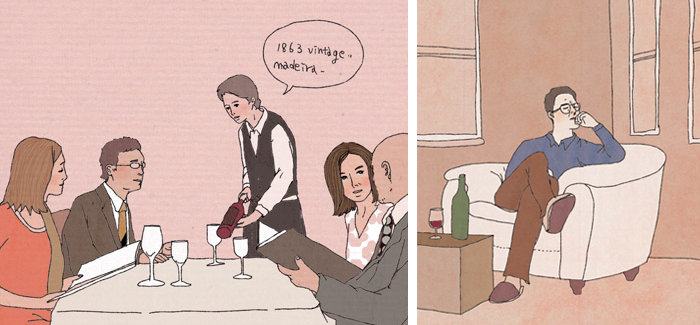
(Illustration by Hyoin Min, CC BY-NC-ND 2.0)
Or, how to enjoy wine without fear.
Americans are nervous about wine. “For us it’s still a very special beverage, with all of its code words and language,” says Bill St. John, AM’77, AM’80, PhD’83. “It has this aura about it.” To those who would attempt to navigate this tricky, class-infested terrain, St. John offers a few guideposts.
How to choose wine when you’re overwhelmed by the selection: “This is what I would do, and this is a novel way of getting information,” says St. John. “Ask questions yourself.”
At Walmart or Costco, that may not be possible, he admits. But at a liquor store or even a grocery store, just ask someone who works there. “In the context of this elitist beverage, people don’t want to ask questions. It shows you don’t know. It takes a little grain of humility, but that’s the way to do it. It’s the way to learn. If you have an inquisitive look on your face, that’s not stupid. That’s smart. You can learn something.”
How to choose from a wine list: Same principle: ask the waiter. “If I’m in a restaurant, I’m there for my pleasure,” he says. “If I don’t know about the wine, someone should tell me. All I should be doing is participating in the exercise of my pleasure. I’m going to be paying two or three times retail for the wine. Do it my way.”
Sniffing the cork: a do or a don’t? A do. It isn’t necessary, says St. John, but it isn’t gauche. Wine drinkers used to be handed the cork to check the domain name printed there and thus avoid counterfeits. Today the ritual has outlived that practical purpose, but “here is a chance for you to smell something beautiful. The wet end of a cork smells exactly like the cellar the wine came from. So I smell it. I smell it deeply. If someone wants to think it’s gauche, it really doesn’t bother me. I just gave myself one more happy for that day. That’s fine with me.”
What to say about wine to sound smart: “That’s not a stupid question, but it’s difficult to answer, and therefore it verges on being stupid,” says St. John. “The assumption is you need to impress somebody, which I think is a bad position to take.”
Box wines: a do or a don’t? A do. “The French and the Spanish have come up with really good-quality box wines,” says St. John. “It’s a way to buy three or four liters of wine at a far less per-bottle cost. … You get a lot of volume with less heavy packaging, so it has a smaller carbon footprint.”
The boxes’ special spigots, he notes, let wine out but don’t let air in, keeping the wine from oxidizing. “You’re going to see more and more of this as the years go by. It’s much, much more ecological to drink box wine.”
How to store wine: Ninety-five percent of the wine that’s sold at liquor stores will be consumed by midnight, so why worry? Just don’t put wine bottles near a stove or in direct sunlight, even for a few hours: “Heat will damage it that quickly.”
What to do with a half-full bottle: Put it in the fridge. It will keep for three or four days. If you first pour the leftover wine into a smaller bottle—plastic is fine, just no aluminum—it will keep for ten days. You can even freeze half-full bottles of wine.
Leftover white and sparkling wine can be drunk cold. To drink leftover red wine, take it out 30 minutes before serving to warm up. “Just don’t microwave it. That’s not a very good idea.”
If you need a decent bottle of wine but the only store is Walgreens: Wherever you are in the United States, you will find these labels: Torres (Spain), Fetzer (California), Antinori (Italy). “Even the Gallo products are actually pretty good,” St. John says. “It isn’t the best possible wine, but that’s not the point.”
The problem is sometimes not the brands, but the storage conditions: the shelving might be in direct sunlight, or there is low turnover so the wine is old.
Vanity wine labels: a do or a don’t? A don’t. “You sometimes are paying for the name and not what’s inside the bottle,” says St. John. The exception: Francis Ford Coppola. “He makes really great wine, he just puts his name all over the place. I don’t know if it’s an ego problem, and I don’t care, because it’s really good.”
Fail-safe wine to give as a gift: Some kind of sparkling wine, whether Champagne, Cava, or something from the West Coast. “It always says festive, congratulations, special.”
Another good choice: a Napa Cabernet Sauvignon. “They’re routinely pretty good. They can also be pretty expensive, so people know you spent some money on them, which is sometimes what you want.”
You bring wine to a dinner party, but the host doesn’t serve it. Should you insist? “It’s gauche to insist,” he says. “But it’s gauche for the host to squirrel it away in the cellar just for his or her own pleasure. I think there’s a responsibility on both sides: for you to shut up, and for the host to be more generous.”
